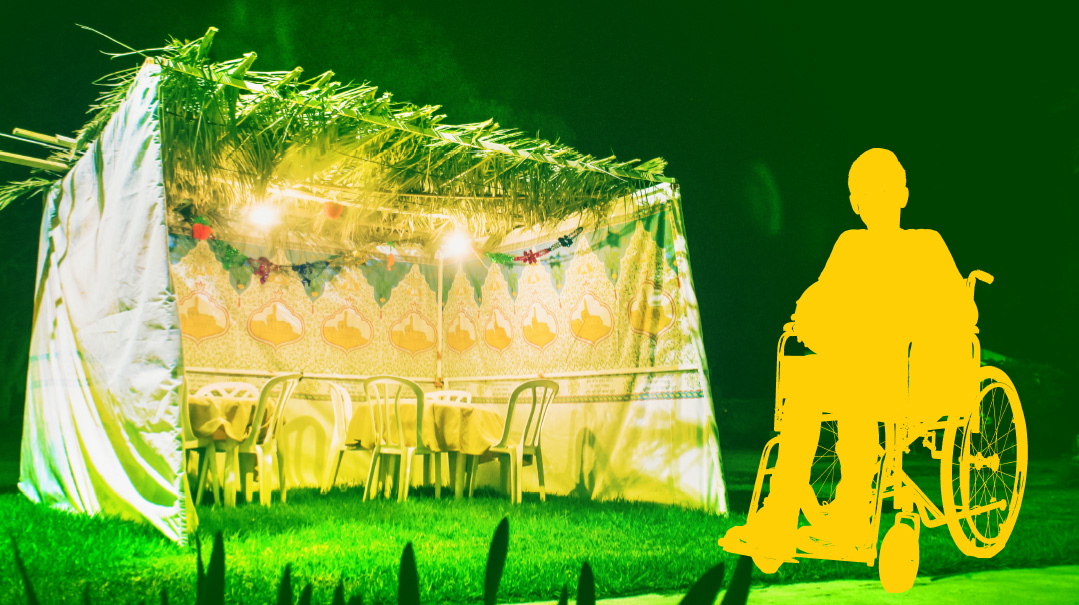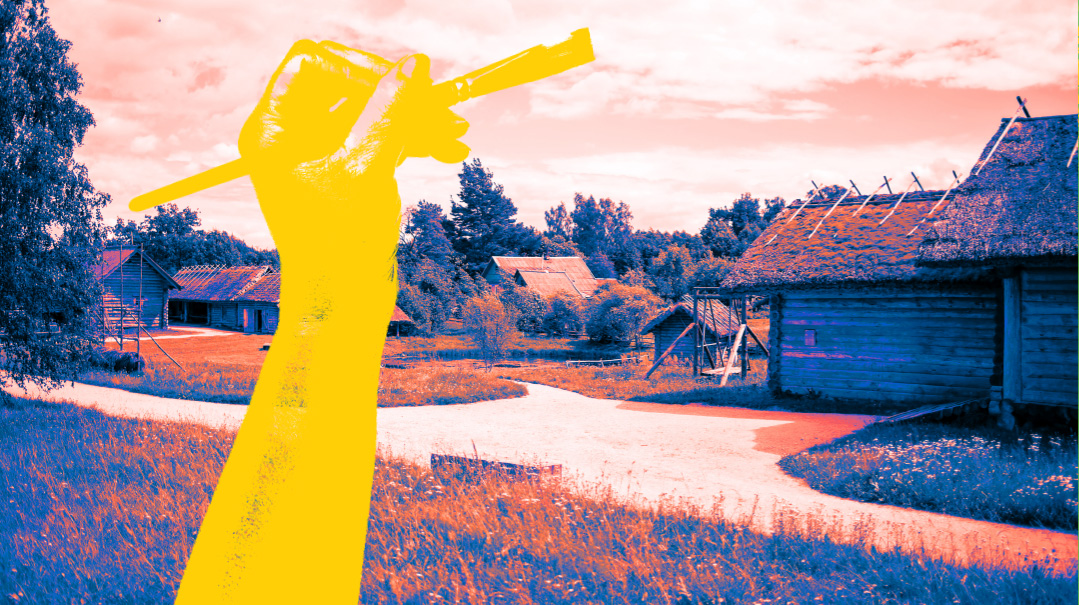Permission Granted
| October 6, 2022“But...but what about a succah?” Yoni wailed. “How come we had to come to this horrible little town?”

Yoni trudged home, kicking the fallen leaves with his scruffy sneakers. The chill in the air was unmistakable, and Yoni heaved a deep sigh. How were they ever going to get through this Succos? Rosh Hashanah and Yom Kippur had been hard enough. With another deep sigh, Yoni turned up the path to his house and let himself in.
It was warm inside. For the first time in a long time, there was actually a really good smell wafting invitingly from the kitchen. Yoni shrugged off his backpack and hurriedly washed his hands — by now, the habit was so entrenched that even with Dovi safely in the hospital, he washed anyway. He rushed into the kitchen and was delighted to find Ma standing at the counter. “Ma!” Yoni whooped.
“Hey, Yoni.” His mother turned around with a smile that hardly even sagged at the corners. “I’m so happy to see you.”
“You’re making supper!” Yoni exclaimed.
“Meatballs,” Ma said. “Your favorite.”
Yoni fought the emotions inside and pumped his fist in the air instead. “Thanks, Ma, you’re the best.” Then he looked at her questioningly. “Who’s with Dovi?”
“Bubby Berkowitz came in for Succos, and she decided to spend her first afternoon here with Dovi,” Ma said. “I was so glad to have a chance to be here when you came home.”
“Will Dovi be home by Yom Tov?” Yoni asked hopefully.
Ma’s smile sagged a little more. “It doesn’t look like it, Yoni,” she said. “I’m sorry.”
“But...but what about a succah?” Yoni wailed. “How come we had to come to this horrible little town? I bet that’s why Dovi’s not getting better. Back in New York this would never happen! Dovi never stayed for such a long time! And also,” Yoni blinked back tears, “back home, the hospital had a succah for Dovi! I still can’t understand why there’s no hospital succah here! How is Dovi going to have Succos without a succah?”
“The complications from Dovi’s surgery were unexpected,” Ma said evenly. “No one imagined Dovi would be in the hospital for such a long time. And yes, Yoni, it’s very disappointing that that there will be no succah for Dovi this year.”
Yoni turned around and left the kitchen. It was amazing that Ma was home — but tomorrow she’d be back at the hospital. Dovi wouldn’t be home for Succos. And worst of all, there would be no succah for Dovi. It wasn’t fair! Yoni stomped up the stairs. He remembered sitting in the hospital succah with Dovi every Chol Hamoed afternoon, playing board games and schmoozing. Even if Dovi couldn’t be home, even if the Levines couldn’t all be together for Yom Tov, couldn’t Dovi have a taste of Succos himself?
Suddenly Yoni made up his mind: He’d speak to the hospital director himself. How hard could it be to get permission to build a succah in the hospital garden?
That was the good part of moving to such a tiny town, Yoni admitted to himself. True, they’d left a lot behind, but who would have imagined biking to visit Dovi? “Going to visit Dovi and Bubby,” he called out to Ma, and sped outside. He gave his bike’s kickstand a nudge with his sneaker and snapped on his helmet. Within moments he was pedaling furiously toward the little hospital. It was a good 20-minute ride, but Yoni was a strong biker, and the cool air and beautiful leaves calmed him as he rode.
It wasn’t even a lie, Yoni assured himself. He would visit Dovi and Bubby — hopefully with the news that there would be a succah for Dovi after all. Not only for Dovi, Yoni realized; Ta would also be much happier. Imagine hardly being able to eat the whole time he was with Dovi! But it was mostly for Dovi — Yoni could not bear to think of his brother, just thirteen months younger than him, spending Succos without a succah. How depressing! And Dovi loved all of the chagim. Having a chronic medical condition and spending weeks at a time in the hospital made Dovi very aware of how precious every aspect of life was. Yoni knew that well.
A while later, Yoni chained his bike to a fence near the hospital. He found a water fountain, wet his fingers, and used them to comb his hair neatly. He tucked his peyos behind his ears, swallowed nervously and walked toward the hospital. It wasn’t large or intimidating like the hospitals Yoni was used to back home, but then again, he’d never approached a hospital director before.
Once in the large lobby, Yoni wasn’t sure what to do next. He walked past the bank of elevators that would take him up to his brother and tried to figure out where to go. The bigger hospitals had information desks, but Dovi’s new hospital wasn’t as fancy. An office. There must be an office or receptionist somewhere. Yoni furrowed his brow and thought hard. The emergency room receptionist was one level lower; ambulances and cars could pull up to the underground parking lot and enter from there. But maybe she wasn’t the right address either; as important as it was, this wasn’t an emergency. Yoni decided to walk around and see if he could find any clues.
He passed the elevators again and continued walking. The x-ray department, a sign for the lab, bathrooms, and then, bingo! A closed door with a no-nonsense sign that read “Administration.” Sounded right. Yoni swallowed again, adjusted his yarmulke and lifted his hand to knock.
A tall lady with high heels and a pink sweater opened the door. She looked surprised to see Yoni standing there, and Yoni felt his heart starting to beat faster. “How can I help you, sir?” the lady asked. Behind the lady there was a desk and several more doors to additional offices. Yoni peered at the doors — perhaps the director was right there. “Um, hello,” he said. “I’m, um, I’m looking for the director of the hospital.” He looked at her hopefully.
The lady’s eyebrows shot up. “Come in,” she said to Yoni. “Why don’t you tell me why you’d like to speak to the director.”
Yoni gulped when he realized he hadn’t even really prepared what he wanted to say. “Um, well, um…”
“Have a seat,” the lady said. “I’m the director’s secretary. Why don’t you tell me what’s going on? Do you have a relative in the hospital?”
“Yes!” Yoni said, grateful for the opening. He sat down gingerly on the padded chair and took a breath. “It’s like this,” he said, earnestly. “My little brother, he’s upstairs, in pediatrics. He has a lot of issues and he spends a lot of time in hospitals… and, well, we have a holiday — a Jewish holiday — we’re, well, we’re Jewish, and there’s an important holiday called Succos, and, well — we need a succah, that is, um, a hut! We need a hut for my brother. And my father. For the holiday.” Yoni blinked fast and swallowed hard. Did he sound absolutely crazy?
“A hut?” the lady repeated.
Yoni nodded quickly. “Yes, yes. A hut. Well, not really a hut. A… a temporary hut.” Yoni was proud of himself for thinking of that word. “For a week.”
“Let’s start at the beginning.” The lady sighed. “Who is your brother?”
“Dovi. Uh, Dov Levine. He’s eleven.”
“And he’s going to be here when it’s time for this holiday?”
“That’s what my mother said.”
“Why don’t you just delay the celebration a bit?” the lady suggested. “When your brother comes home, you can build your clubhouse, er, hut.”
“No,” Yoni said incredulously, “it doesn’t work like that! It’s the hala— er, Jewish law. It has to be at the right time. A week later isn’t good.”
“What does this hut look like?”
“It’s, um, square, well it can actually be any shape really — it has to have walls, well I think actually only two and a half walls — and kosher sechach — um, like, branches or bamboo or something on top.”
“You eat branches?” the lady said, her eyebrows shooting up again.
“No! No eating branches,” Yoni assured her. “We put them up. Like a ceiling.”
“So then why do they have to be kosher?” asked the lady, clearly confused.
“To make the succah kosher!” Yoni was getting frustrated.
“So you eat the hut?”
Yoni didn’t know whether to laugh or to cry. “We don’t eat the hut. Kosher isn’t just for food. It’s for anything that — that goes according to halachah — to Jewish law. To make the succah kosher, it needs to have kosher sechach. Like branches or bamboo.”
“So you build it under a tree?” The lady was clearly trying to understand.
“No,” Yoni said, aghast. “That would me the succah passul — uh, unkosher.”
“So you need a hut. With two and a half walls. And branches for a ceiling.”
“Exactly!”
“On hospital grounds.”
“Right. So Dovi can visit a succah.”
“For a week.”
“Right!”
At that moment an imposing woman in a navy blue suit entered “Oh, Ms. Parker,” the lady with the pink sweater exclaimed, “Perfect timing. This young gentleman here was inquiring about the possibly of constructing a temporary hut—”
Ms. Parker’s eyes shuttered. “Not on hospital property.”
“Just a for a week,” Yoni pleaded.
Ms. Parker, who Yoni assumed was the director, turned to him. “Young man, whatever makes you think I’ll change my mind? I’ve told your parents it’s not an option. Not on hospital property. It’s against the rules.”
“Please,” Yoni said. “It’s for our holiday. We’ll build it ourselves. We’ll take it down. We won’t leave any mess. For my brother!”
Ms. Parker looked at Yoni so coldly that he actually shivered. “No.”
Pink-sweater avoided Yoni’s eyes. Ms. Parker marched to the last door on the right, entered the room, and shut the door firmly behind her.
“I guess that’s that, then,” Pink-sweater said.
“I… I can’t,” Yoni mumbled. “I need to do this. For… for Dovi.” Yoni’s eyes glistened with tears. “He misses out on so much.”
Pink-sweater shuffled some papers. “I’m sorry,” she said.
“Isn’t there anything you can do?” Yoni begged.
“No. Ms. Parker is my boss.” The lady tapped a pen against the table, thinking. “But you know what? She has a boss, too. The CEO — the official head of the hospital. He hires the director. But… don’t get your hopes up. The CEO will usually back Ms. Parker on every decision she makes.” Pink-sweater continued tapping her pen. Tap, tap, tap. “Leave me your number,” she said at last. “I’m not sure I can help you… but you’re just a kid, and you’re trying to help your brother — a patient in our hospital, and a kid, too. I like that. I like that you care, and that you want to do something about it. Let me look into this — but,” Pink-sweater warned, “like I said, don’t get your hopes up.”
Yoni thanked the lady as sincerely as he could and stepped out the office, dejected and not really hopeful. I have until I get up to Dovi’s room to find a smile and put it on my face, he thought bravely. He thought of Ma and her sagging, tired smile. But she always smiled. Yoni tried to stretch his cheeks into a smile; he couldn’t go into Dovi’s room without one. Succos or not, Dovi needed Yoni to be supportive and cheerful.
For two whole days, Yoni didn’t hear anything. He couldn’t stop picturing the first night of Succos, with most of the family gathered together in their beautiful succah with sparkly decorations. And Dovi, in his hospital room, with just Ma or Ta at his side. No succah. No decorations. Yoni couldn’t bear it.
On Erev Succos, the phone rang. Someone called Yoni to the phone and Yoni picked it up hesitantly. It was the lady in the pink sweater. “Yoni Levine?” she said. “It’s Ms. Parker’s secretary. I, well, I took up your case. The CEO agreed that it would be a case of religious accommodation. But he agreed with Ms. Parker that it would be impossible to build it in the hospital gardens; it wouldn’t be appropriate. Would a small section of the rooftop be suitable?”
Yoni’s heart pounded. He couldn’t believe his ears. “If it’s safe, and Dovi can get there, that would be amazing!”
“Well, then, you better hustle. I hear the holiday begins at sundown?”
“Right!” Yoni thanked the secretary and then gave the phone to his father. “Ta, it’s the hospital director’s secretary. She says we can set up a succah for Dovi!” Ta’s eyes widened as he took the phone. Yoni grinned bashfully and ran down the stairs. He’d help Ta find a pop-up succah with some bamboo mats for sechach. It was still early enough in the day to make the arrangements. And maybe his sisters would even have time to create some special decorations just for Dovi.
Dovi would have a succah!
Yoni knew that whatever that succah looked like, it would be the most beautiful succah in the world.
You could even call it a work of art.
Or maybe, a work of heart.
(Originally featured in Mishpacha Jr., Issue 931)
Oops! We could not locate your form.



